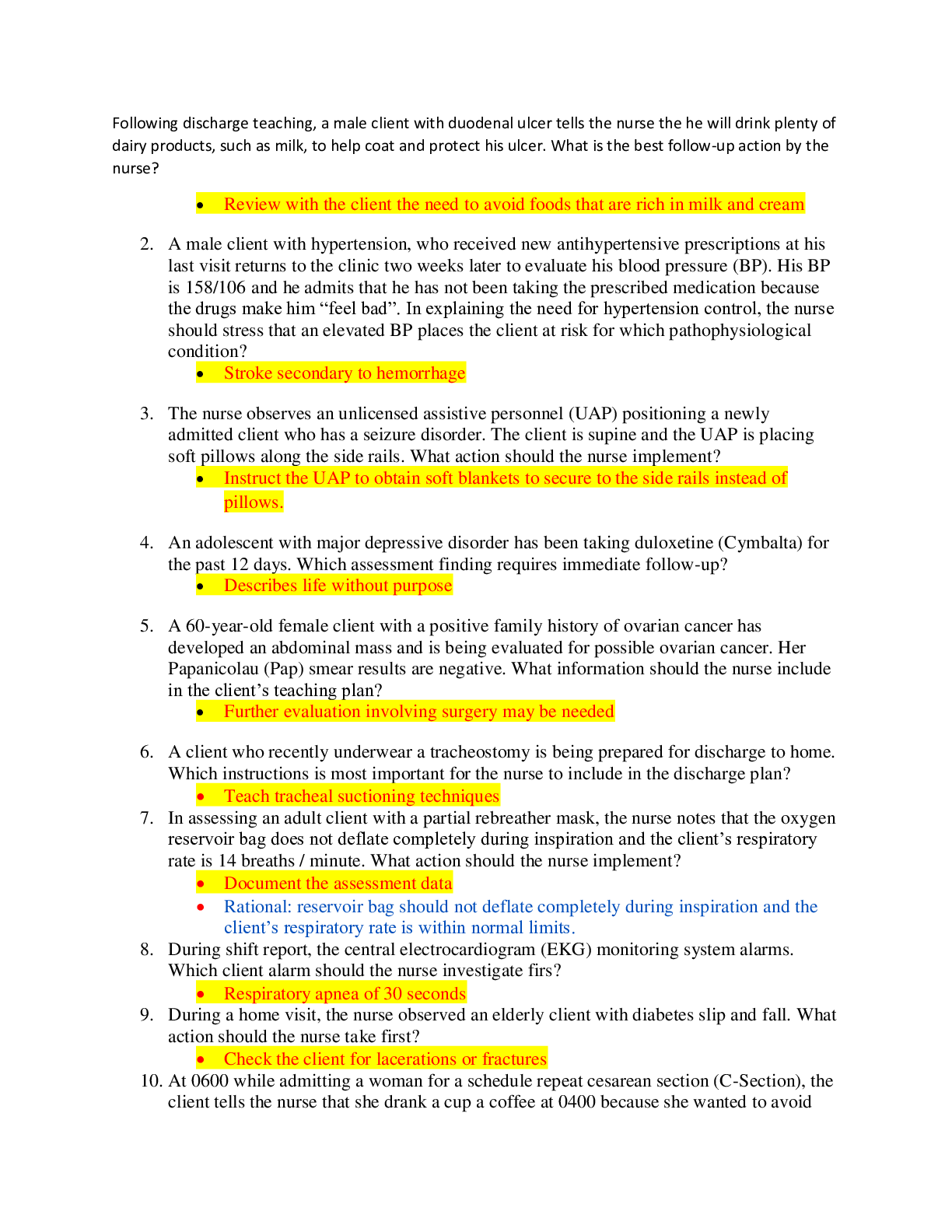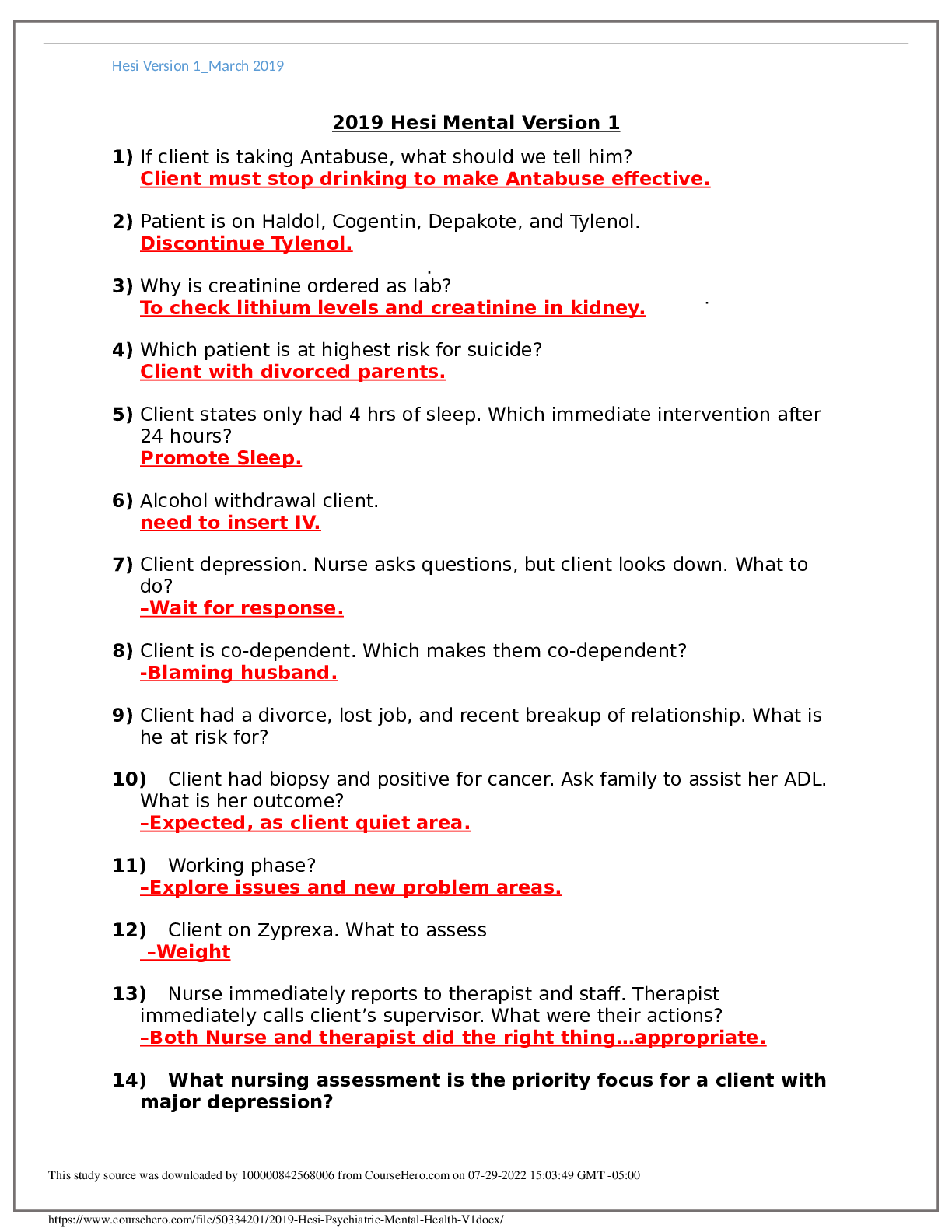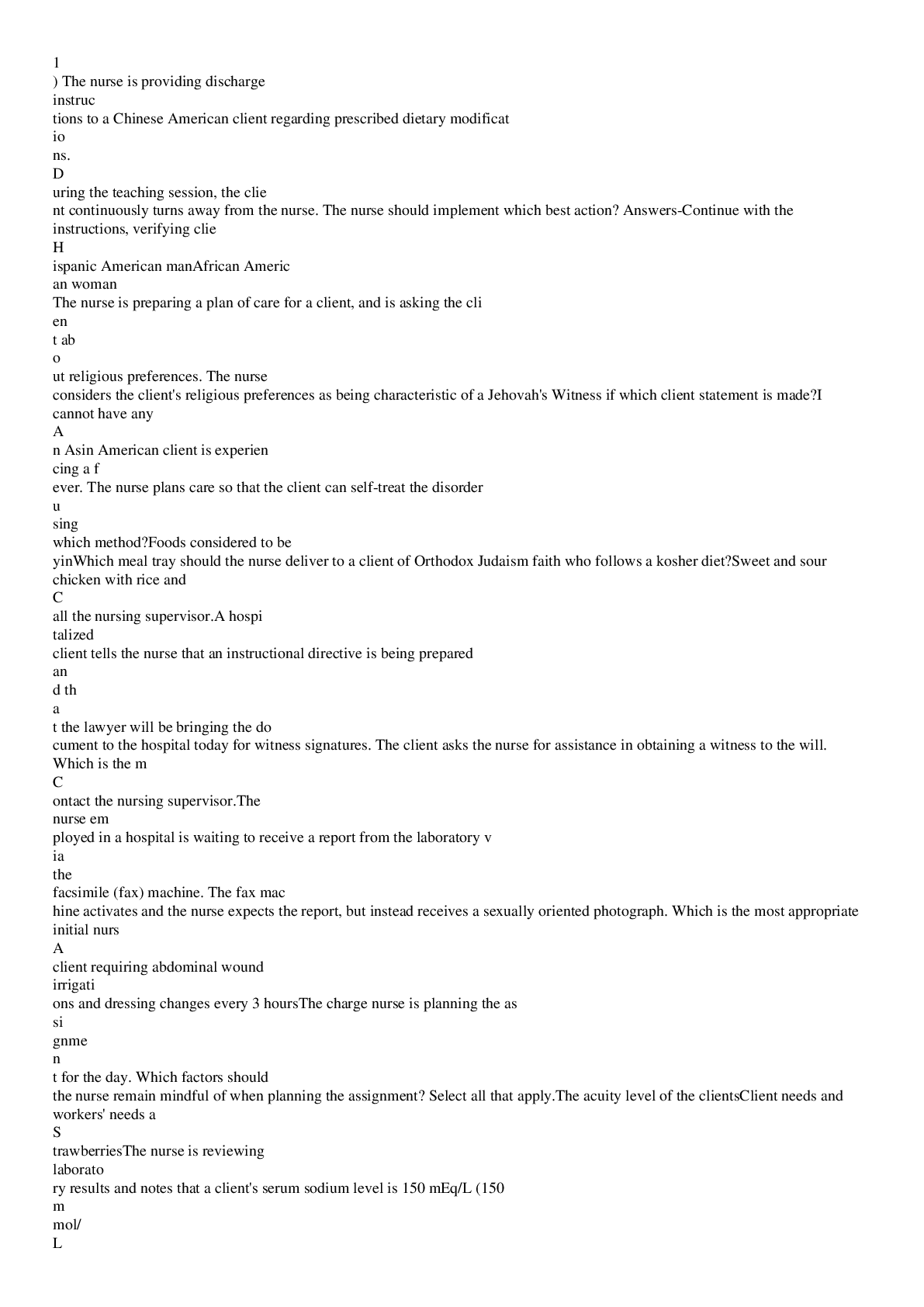*NURSING > HESI MED SURG > 51751563-Med-Surg-HESI-Study-Guide (All)
51751563-Med-Surg-HESI-Study-Guide
Document Content and Description Below
51751563-Med-Surg-HESI-Study-Guide Ueriatrics 1. HESI HINT: Confusion: not enough or too much stimulation 2. HESI HINT: decrease efficiency of heart and lungs□decrease oxygen utilization□decr... ease activity tolerance. Recommend rehab programs, exercise, and nutrition Cardiovascular Disease: HESI HINTS 1. decreased cardiac output & dysrhythmias: syncope, falls, and TIAs 2. Respiratory A. Lungs are less elastic, which makes it more difficult to breathe B. Cough is not as efficient C. They are more likely to develop chronic bronchitis, emphysema, and pneumonia due to less efficient cough 3. UI A. Decreased enzymes-decreased efficiency of digestive process B. Decreased intestinal motility C. Laxative abuse D. Decrease in fluid intake and mobility 4. Urinary A. Urinary output is the first sign of loss of renal integrity B. lower specific gravity €1.001 C. Proteinuria D. BUN €30 E. DM: fatigue, infection, sensation F. Decreased UFR□decreased drug clearance A. Penicillin B. Tetracylcine C. Digoxin U. Decreased capacity of bladder□frequency and nocturia H. Weakening□decreased urge and sensation to void□UTI I. Kegel exercises: tightening and relaxing the vaginal and urinary meatus to prevent incontinence 5. Neurologic A. Delay in reflex responses 6. LOC, sensory, & mental 7. Endocrine A. Decreased metabolism, aldosterone secretion, urinary output, and glucose intolerance B. Hypothyroidism can lead to depression C. Thyroid dysfunction and diabetes are most common 8. Musculoskeletal A. Decreased lean body mass and increased muscle fat 9. Hearing A. hearing of high-pitches diminishes first B. Presbycusis-decreased hearing acuity I. Decreased socialization II. Avoidance of friends and family Iii. Decreased sensory stimulation IV. hazardous conditions while driving 10. Pseudodementia A. Barbituates, lithium, atropine, bromides B. Nutrition deficiency C. Depression D. Metabolic disorders, hypothyroidism, anemia, and hypoglycemia E. Speak in calm voice and avoid excitement 1. Pneumonia Respiratory A. Increased respiratory rate B. Irritability and restlessness C. Fever, shaking, crackles (lungs are filled with fluid) D. Chills, productive cough (alveoli is filled with fluid) E. Confusion and lethargy in elderly F. Assess ABUs U. Deep breath, cough, suction H. Hint: irritability and restlessness are the first signs of cerebral hypoxia I. provide hydration J. Difficulty breathing□stiff lungs□hypoxia K. Decreased breath sounds□congested lungs 2. Always give steroids last A. Follow with oral hygiene due to risk of super-infection 3. Singulair (a leukotriene) A. chronic asthma 4. oral suctioning is not sterile 5. Mask, gloves, and goggles for suctioning 6. Acute Respiratory Failure A. Ph less than 7.35 B. Oxygen less than 50 C. C02 greater than 50 Neurosensory 1. Encephalitis A. Vitals I. Widened pulse pressure II. Bradycardia III. Irregular respirations IV. Eyes do not PERRLA V. Elevate head of the bed to 30 or 45 degrees 2. Parkinson's A. Dopamine 3. Hydrocephalus A. IICP B. 6th nerve defect 4. Meningitis A. 3, 4, 6, 7, 8 5. Lumber puncture A. Measure pressure in CSF B. Indicate neuro disorders, infections, brain, or spinal cord damage 6. EEU A. Avoid caffeine and hair products before the test 7. IICP A. Compresses brain structures B. Reduces blood flow C. Widened pulse pressure D. Bradycardia E. Increased temp. F. Cheyne-stokes U. Administer oxygen and monitor intake and output H. Elevate head of bed 30-45 degrees 8. Seizures A. Prodromal ……………………………………………….CONTINUED………………………………………. [Show More]
Last updated: 2 years ago
Preview 1 out of 22 pages
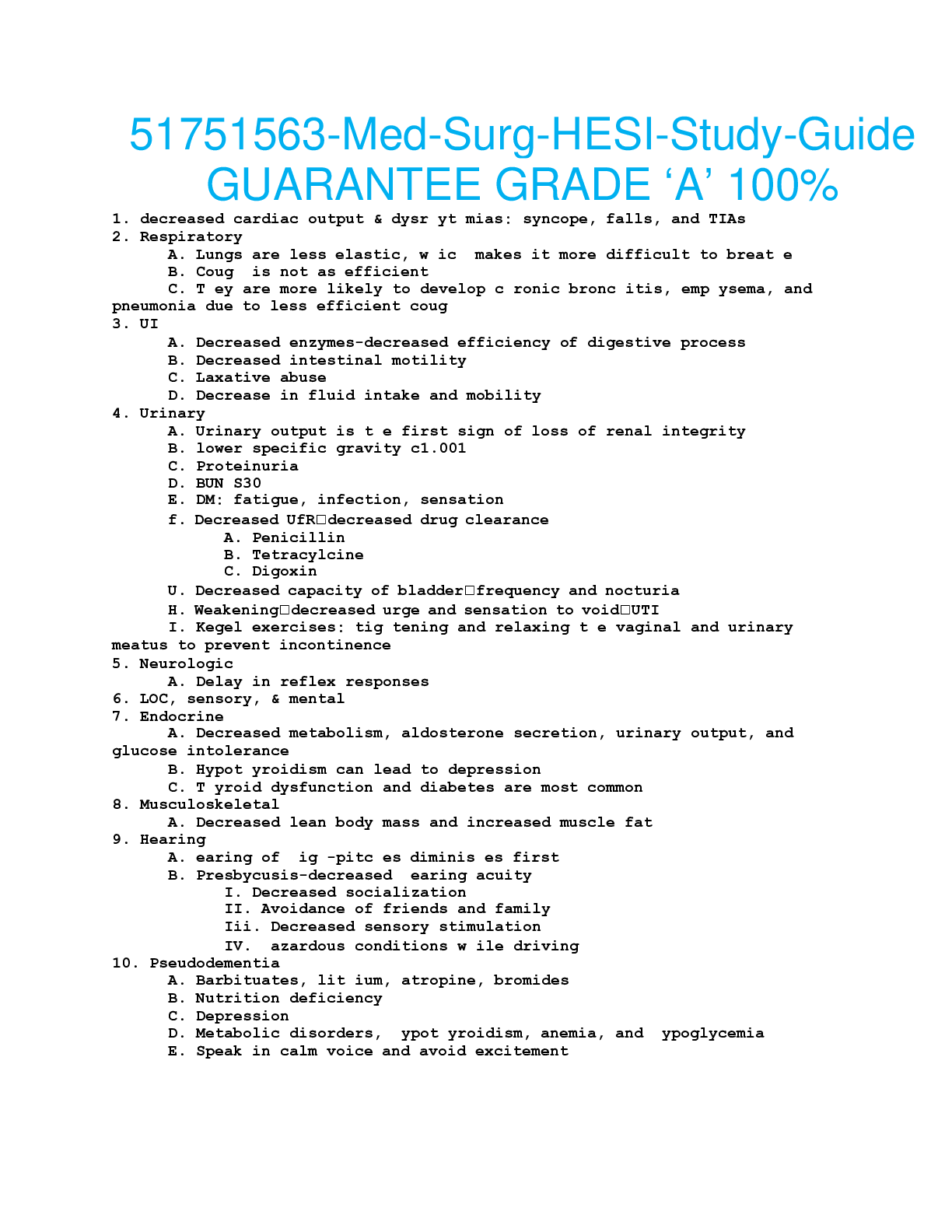
Buy this document to get the full access instantly
Instant Download Access after purchase
Buy NowInstant download
We Accept:

Reviews( 0 )
$10.00
Can't find what you want? Try our AI powered Search
Document information
Connected school, study & course
About the document
Uploaded On
Feb 07, 2021
Number of pages
22
Written in
Additional information
This document has been written for:
Uploaded
Feb 07, 2021
Downloads
0
Views
118


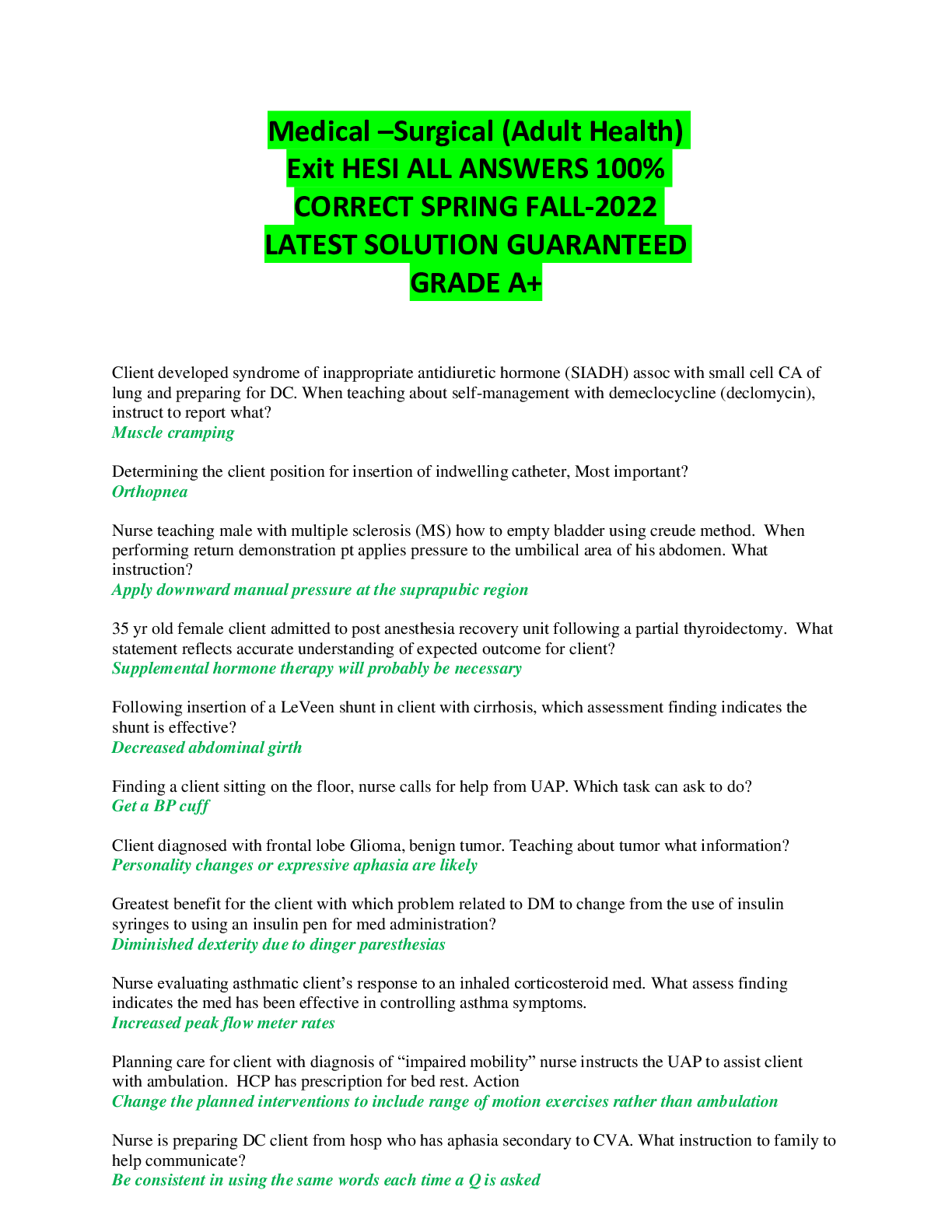
 (1).png)
.png)


